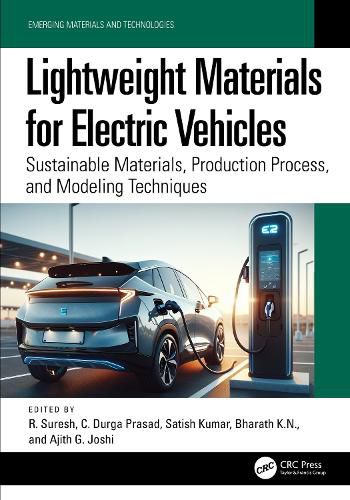Readings Newsletter
Become a Readings Member to make your shopping experience even easier.
Sign in or sign up for free!
You’re not far away from qualifying for FREE standard shipping within Australia
You’ve qualified for FREE standard shipping within Australia
The cart is loading…






Lightweight Materials for Electric Vehicles serves as a comprehensive guide to the seamless integration of sustainable materials, advanced manufacturing techniques, and innovative solutions to tackle industry challenges. It underscores the pivotal role of academia in equipping the next generation of engineers with expertise in electric vehicle (EV) technologies. The book provides an in-depth exploration of the latest advancements in lightweight materials for EVs, focusing on their properties, applications, processing methods, and the challenges they present.
Furthermore, it examines emerging trends such as AI- driven design, additive manufacturing, and the adoption of circular economy principles in automotive materials engineering. By addressing the evolving complexities of material selection and manufacturing, the book offers valuable insights into the future of EV innovation, extending its relevance to sectors beyond automotive, including aeronautics and aerospace.
Through case studies and research findings, the book also provides practical implementation strategies and actionable recommendations, while reinforcing the critical role of academia in driving progress and innovation in this transformative field.
Features: * Discusses contemporary issues and challenges in the selection criteria of materials for electric vehicles. * Explores various materials employed for electric vehicle batteries, such as lithium- ion, nickelmetal ydride, and solid- state batteries. * Overviews the use of lightweight materials, such as aluminum, carbon fiber-reinforced olymers, and magnesium alloys, in electric vehicle bodies. * Reviews different types of materials, their sustainability, feasibility of usage, and challenges. * Presents case studies on the application of different materials in electric vehicles.
This book is an essential resource for practitioners, research scholars, academicians, and students involved in the study and development of materials for electric vehicles.
$9.00 standard shipping within Australia
FREE standard shipping within Australia for orders over $100.00
Express & International shipping calculated at checkout
Stock availability can be subject to change without notice. We recommend calling the shop or contacting our online team to check availability of low stock items. Please see our Shopping Online page for more details.
Lightweight Materials for Electric Vehicles serves as a comprehensive guide to the seamless integration of sustainable materials, advanced manufacturing techniques, and innovative solutions to tackle industry challenges. It underscores the pivotal role of academia in equipping the next generation of engineers with expertise in electric vehicle (EV) technologies. The book provides an in-depth exploration of the latest advancements in lightweight materials for EVs, focusing on their properties, applications, processing methods, and the challenges they present.
Furthermore, it examines emerging trends such as AI- driven design, additive manufacturing, and the adoption of circular economy principles in automotive materials engineering. By addressing the evolving complexities of material selection and manufacturing, the book offers valuable insights into the future of EV innovation, extending its relevance to sectors beyond automotive, including aeronautics and aerospace.
Through case studies and research findings, the book also provides practical implementation strategies and actionable recommendations, while reinforcing the critical role of academia in driving progress and innovation in this transformative field.
Features: * Discusses contemporary issues and challenges in the selection criteria of materials for electric vehicles. * Explores various materials employed for electric vehicle batteries, such as lithium- ion, nickelmetal ydride, and solid- state batteries. * Overviews the use of lightweight materials, such as aluminum, carbon fiber-reinforced olymers, and magnesium alloys, in electric vehicle bodies. * Reviews different types of materials, their sustainability, feasibility of usage, and challenges. * Presents case studies on the application of different materials in electric vehicles.
This book is an essential resource for practitioners, research scholars, academicians, and students involved in the study and development of materials for electric vehicles.